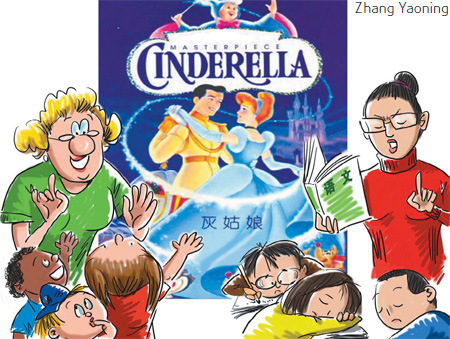 Last year, I received an e-mail story from a friend. She often sends me interesting postings with bi-cultural significance.
Last year, I received an e-mail story from a friend. She often sends me interesting postings with bi-cultural significance.
This one was about the difference between the Chinese and American ways of teaching the Cinderella story. Here it goes:
In an American school, the teacher asks her students: What if Cinderella does not leave the ball at midnight? And they answer: She will resume her dirty look. So the teacher concludes, it shows the importance of being punctual and looking your best.
She then follows up with a new perspective: Would the students do the same thing had they been her cruel stepmother? They hesitate, but say yes. The stepmother, suggests the teacher, is not totally evil. She loves her own children and her failing is her inability to love others.
The teacher then probes what makes Cinderella resolve to go to the ball despite her stepmother's objections. It's the fairy godmother who offers help, say the students. That shows, continues the teacher, that everyone needs help from friends. The more friends you have, the better you'll cope with future problems.

She further examines Cinderella's decision to go to the ball. Even if nobody had objected, she would not have bothered if she had not wanted to go, so her determination was crucial. When you feel others don't love you, you should love yourself, and when others don't give you opportunities, give yourself more opportunities.
The students finally examined possible loopholes in the fairytale and discussed how, although everything changed back at midnight, one of Cinderella's slippers did not, which seemed to go against the moral of the story. They were praised for having a sharp eye.
Now, the Chinese methodology:
Teacher: Did you all preview this text?
Student: This is an old wives' tale. Everyone knows it. Who needs to prepare for it?
Teacher: Who is the author? Is it Grimms or Andersen? And do you know the life story of the author?
Student: We have eyes and the answer is printed in the text.
Teacher: What's the significance of this story?
Student: It sounds so serious it looks like we are going to be tested later on.
Teacher: Now, let's get to the text. Who can divide it into sections?
Student: The beginning, the middle, and the last section, as usual.
Teacher: Now, about this sentence, is it a simile or a metaphor?
Several students start to doze off.
Teacher: If I change this particular word, it won't be as good as the one in the text? Why did the author have that word choice?
More students doze off.
Teacher: Can we change the place of these two sentences? And why not?
Most students fall asleep.
Teacher: Now, if you don't listen in class, you cannot get high scores; and without high scores you cannot get into colleges; and without college, you can't... This is the way of life.
End of story.
